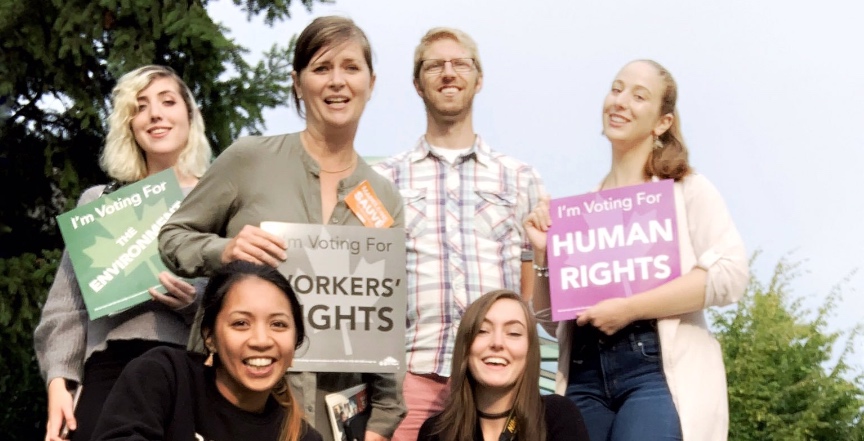Abbotsford is one of the most staunchly Conservative federal ridings in British Columbia.
In fact, Conservative MPs have represented the district since it was created in 2004, and, despite dropping 18.6 percentage points, incumbent Ed Fast won the district handily with 48.3 per cent of the vote in 2015.
However, this year’s NDP challenger, Madeleine Sauvé believes the city is changing. For example, the NDP candidate said that some families moving into the city from Vancouver and the interior are importing pro-LGBTQ views that are at odds with the socially conservative positions typically associated with some of the Fraser Valley region’s Christian communities.
“I attended a pride event this summer, and I was very proud of Abbotsford,” she told rabble.ca. “It was very well attended, and it was a very diverse crowd. It was a celebration, and there was no controversy or backlash present.”
While it’s unlikely Sauvé will even come close to unseating Fast, the NDP candidate says her campaign is working hard to at least establish a progressive beachhead in the city. She is one of several candidates carrying a left-leaning platform deep into B.C.’s right-wing heartlands.
Sauvé said the NDP’s attention to housing, transportation, climate action and access to education is connecting particularly well with pockets of voters in her community.
“People are definitely looking for stability,” she explained. “If they’re working-class people, they still feel at risk of being displaced. There’s that precariousness that is worrisome and stressful.”
Although rent in Abbotsford is more affordable than Vancouver, the Canadian Rental Housing Index still ranks the Fraser Valley region as “severely unaffordable” for households earning up to $22,749 per year, and “unaffordable” for those earning up to $42,903 per year. The NDP platform promises to create 500,000 units of affordable housing across Canada in 10 years.
However, Sauvé said deeply entrenched conservative views spanning generations can present major challenges to getting that message across.
“I will encounter families walking together, and when I say ‘NDP,’ the older people in the group immediately shutdown, and the younger people are somewhat interested,” she said.
Sauvé added that during the nomination process, she met women voters who said they had to ask permission from their husbands before signing the NDP candidate’s papers.
Despite these deep-seated obstacles, however, Sauvé said that the BC NDP provincial government’s measures aimed at addressing affordability issues — such as the Speculation and Vacancy Tax — have helped bolster the federal party’s brand in some parts of the district.
“I’m not talking to people who are investors, I’m talking to people who are renting or who are new buyers,” she said. “For the longest time, Christy Clark’s Liberals said the solution was to build more condos, and that just seemed to exacerbate the issue.”
But if pitching investment in public services sounds difficult in a district largely ruled by conservative thinking, imagine campaigning for a large-scale transition away from fossil fuels in oil and gas-producing regions.
That’s what the Green party’s Catharine Kendall is doing in the Prince George-Peace River-Northern Rockies riding.
The region is home to several fossil fuel sites, including a refinery in Prince George and natural gas facilities around the Montney formation.
Perhaps not surprisingly, various conservative MPs have represented the area since 1972. The current representative, Bob Zimmer, won in 2015 with 52.5 per cent of the vote.
“I’m coming from a place of just going to listen to everybody,” Kendall said. ” I feel that everybody’s story is valid, and so I don’t really expect there to be much hostility or negativity.”
Kendall noted it’s not only oil and gas workers who live and vote in the riding. The Green candidate previously worked with Health Canada in the Blueberry River Nation, which was exposed to a sour gas well leak in 1979.
“They were literally moved a kilometre away, and were still surrounded by sour gas well leaks,” Kendall said. “They are still in court as of this year, expecting some kind of compensation.”
A 2016 report by Ecotrust found that, according to B.C. government data, up to 84 per cent of the Blueberry River traditional territory has been negatively affected by industrial activity.
“That really woke me up to the impact on people that live in these areas,” Kendall continued, “people who don’t have choices about what’s behind their front and back door. I want to bring those perspectives to the broader public.”
The Green candidate said she could imagine her party’s “Mission Possible” climate action program creating more jobs in waste management, local food production, and hemp farming in the region. However, she added, the immediate challenge in northern B.C. is overcoming the region’s petro-identity conservatism, which oil and gas industry-sponsored astro-turf groups continue to fuel.
“It’s all about special interest groups, and the larger the special interest group the more power they have,” Kendall said, “so then we have First Nations people who are basically under the auspices of the corporations because that’s who’s in their backyard.”
Both Kendall and Sauvé agree Canada’s first-past-the-post voting system is shutting out significant pockets of support for progressive counter narratives.
“It was a real visceral disappointment [when Trudeau broke his promise on electoral reform],” Sauvé said, “and I feel like other things have overshadowed that disappointment.”
“There are clusters of people who think one way, and are going to be run by a political voice that’s taken by the majority,” Kendall said. “Overall we still need to educate lots of people about voting, period.”
Alex Cosh is a journalist and PhD student based in Powell River, B.C. His work has appeared on PressProgress, Left Foot Forward and in several local B.C. publications.
Image: Madeleine Sauvé/Twitter




